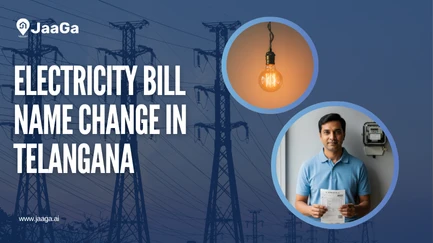Regarding property ownership, accuracy in documentation is not just a matter of good housekeeping—it’s essential for legal validity, ease of transactions, and future dispute resolution. One of the most common yet overlooked issues is the incorrect or inconsistent mention of the owner's name across key property documents like the Sale Deed, Encumbrance Certificate (EC), Property Tax records, and Utility Bills, such as the Electricity Bill.
This blog explains why it is crucial to keep the owner’s name correct and consistent on all property-related documents, whether you are a buyer, seller, investor, or heir.
1. Legal Validity and Ownership Proof
The Sale Deed is the primary legal document that proves ownership of a property. If the name on the sale deed is misspelled or incorrect:
- It can raise questions about the authenticity of the document.
- It may create ambiguity about ownership, especially during legal disputes or verification processes.
Solution: Always cross-verify your name with your Aadhaar, PAN, and other legal IDs before executing a Sale Deed.
2. Encumbrance Certificate (EC) Verification Issues
The Encumbrance Certificate shows the legal history of ownership and whether there are any liabilities on the property. If your name is not reflected correctly:
- It may impact future sales, as the buyer may suspect a title defect.
- Banks may reject loan applications due to mismatched ownership records.
Note: The name on the EC is typically drawn from the records of registered sale deeds, so errors in your sale deed get carried forward.
3. Challenges in Paying or Transferring Property Tax
Property tax records maintained by municipal bodies should match the actual owner. An incorrect name on the property tax record can:
- Make it difficult to claim ownership or request changes.
- Lead to delays in transferring property tax after a sale or inheritance.
- Causes problems in availing property-related subsidies or benefits.
Important: Ensure that any ownership transfer is immediately followed up with a name update in the property tax department.
4. Utility Bills – Not Just a Service Record
While documents like the Electricity Bill or Water Bill may seem minor, they play an important role in:
- KYC checks during resale or loan applications.
- Address proof for official purposes.
- Establishing possession or occupancy in legal matters.
A mismatch between the electricity bill and the sale deed can delay resale, rentals, or even loan disbursement.
5. Avoiding Disputes and Litigation
Incorrect documentation can lead to:
- Heirship or inheritance complications.
- Family disputes over rightful ownership.
- Delays or legal battles during sale, partition, or redevelopment.
Prevention is better than a cure. Having all documents consistently updated with the correct owner name can avoid years of unnecessary legal trouble.
How Jaaga Can Help You Fix Name Errors
If you’ve discovered that your name is incorrect on one or more property documents, don’t panic—JaaGa is here to help. With deep expertise in legal documentation, land records, and government processes, JaaGa offers end-to-end assistance to resolve these issues smoothly.
Here’s how JaaGa helps:
✅ Sale Deed Name Corrections
- We assist in drafting and registering rectification deeds with the sub-registrar's office.
- Our legal team ensures the correction is legally valid and properly recorded.
✅ EC (Encumbrance Certificate) Updates
- We help file the necessary applications to reflect the corrected name on the EC.
- We also ensure it is updated in the Sub-Registrar and online property portals where applicable.
✅ Property Tax Name Update
- Jaaga coordinates with local municipal authorities to submit the required documents and affidavits for name change.
- We handle follow-ups until the name is corrected in official tax records.
✅ Electricity and Utility Bills
- We help draft the necessary request letters, affidavits, and ID proofs required to update your name with the electricity boards.
- Our team coordinates with the utility provider to ensure timely correction.
Final Thoughts
A property is a long-term asset, and small documentation errors today can lead to big problems tomorrow. Ensuring that the owner's name is correctly and consistently recorded across all property-related documents is not just a legal requirement—it’s a smart and responsible action for every property owner.



